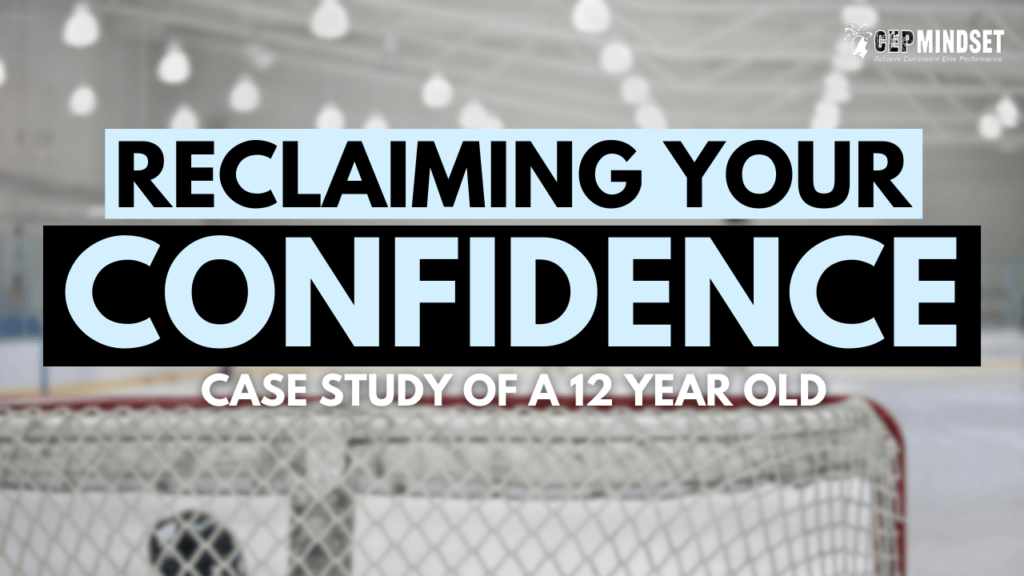
A 12 year old AAA hockey player’s whole world has been flipped upside down. As a AAA player he has spent the last 4 years training, preparing, and dedicating himself because of his love of the game.
But all of a sudden his belief in himself starts to waver because now he is sitting on the bench, watching his teammates play over him.
Quickly, all the trust and belief he had built up disappears, and he is playing as his worst-self, what he calls The Bull Turtle (angry and slow).
No matter what he tries each game the Bull Turtle keeps showing up and this trust in himself slips away more and more.
He stops playing with instinct. Fear and doubt consume him, and now he has stopped trusting himself.
Instead of carrying the puck with confidence, he passes it off as soon as it touches his stick – not because it is the right play, but because he was afraid of making a mistake. For the first time in four years, he did not want the puck.
The thought of his coach calling him out in front of the team consumes him, and it prevents him from focusing on what he can control.
He is not just losing ice time anymore, he is losing himself, the player he knew he could be and was. He is worried and has no idea how to stop the downward spiral.
Something had to give, it would have to be his love for the game or his fear.
He and his parents knew it wasn’t just about working hard, more ice sessions, or more private lessons.
The real challenge was mental.
That’s when, I (coach Sara), had the privilege of meeting him and helping him regain his love for the game and himself.
Step 1: Facing the Mental Challenge
When this particular client first started working with me, he wasn’t sure what to expect.
He thought the solution would be simple—maybe a confidence trick, a breathing exercise, or some motivational talk.
Instead, the first step was getting real about what was happening inside his head. By using the CEP assessment and encouraging him to be honest with himself, we were able to identify the following mental blocks:
- Fear of making mistakes and being criticized.
- Lack of confidence with the puck, leading to rushed decisions.
- Comparing himself to his teammates instead of focusing on his own growth.
- Letting frustration take over during games.
- Feeling like he didn’t have a voice or impact on the team.
Instead of labeling these mental blocks as failures, we framed them as opportunities to grow.
Step 2: Creating a Mental Game Plan
Once we identified the root challenges, it was time to build a strategy.
Together, we worked on key principles that would help him regain his confidence, play with purpose, and develop resilience.
Here are the key mental tools that we worked on together in order for him to regain control of his mindset.
✅ Alter Ego – Together, we created his Alter Ego, which brought clarity on who he wanted to BE and what he wanted to DO vs. focusing on the results and outcomes. He created “The Andez”, someone who worked hard and trusted himself. “The Andez” was inspired by a vacation he had with his family that allowed him to connect with the narrative of calmness and centeredness, which he felt was when he could be at his best.
✅ 3/4 Attack Mindset – Teaching Robbie to own the puck, attack the play, and stop second-guessing himself.
✅ “Smell the Flowers, Blow the Bubbles” – A simple breathing technique to reset after mistakes and keep composure. Using this concept, along with embracing the other steps of the reset routine, acceptance, and commitment, he continually built his resiliency to the point where he could prioritize resilience over perfection and not be derailed by mistakes or bad shifts.
✅ The “What If” Game (Optimistic Thinking) – Instead of fearing failure, I challenged him to ask himself:
- What if I dominate today?
- What if I make an impact this game?
- What if I just focus on having fun and trusting my training?
✅ Post-Practice and Game Reflection – Writing down five things he did well after every practice/game and two areas to improve—shifting the focus from perfection to progress.
These strategies weren’t just theory—they were daily habits.
Step 3: Taking It to the Ice
The real test wasn’t in the meetings.
It was in the moments that mattered.
Would “The Andez” actually trust himself in a game? Would he still hesitate when the puck came to him?
With every shift, he started to see a difference.
He learned to:
✅ Be more aggressive with the puck instead of defaulting to a pass.
✅ Handle frustration without letting it throw off his game.
✅ Control what he could control—his effort, preparation, and attitude.
✅ Recognize mistakes as part of the process instead of letting them define him.
✅ Enjoy hockey again—without the constant pressure of being perfect.
With each game, his confidence grew.
Instead of feeling like an outsider, he started stepping up as a leader.
Not just because he was playing better—but because he trusted himself.
Step 4: Looking Back & Moving Forward
Now, six months into his mental performance journey, he sees and feels the transformation within himself.
He’s more than just a better player—he’s a mentally stronger athlete who knows how to handle pressure, frustration, and setbacks. Here is how he describes it:
“Sara taught me so many things—like the 3/4 attack mindset, how to not get frustrated, and how to manage my stress and focus better. I have become more resilient and mentally stronger because of her coaching.
Now, I’m better prepared to handle the pressure that comes with playing at this level.
She made me realize that scoring goals and winning games isn’t everything—it’s about improving myself and being a leader.”
My client’s story isn’t just about hockey.
It’s about growth, resilience, and learning to trust yourself.
Whether you’re playing at an elite level or just getting started, one thing is clear:
Mental strength is just as important as skill.
If you’re feeling stuck, frustrated, or doubting yourself, remember:
✅ Mistakes don’t define you. How you respond to them does.
✅ Frustration is normal—but discipline helps you push through it.
✅ Success isn’t about perfection—it’s about progress.
Every athlete has the ability to take control of their mindset and play with confidence.
Sometimes, all it takes is the right tools and a strong commitment to apply them.

 Nicholas is a Senior High-Performance Coach and holds a doctorate in Sport & Exercise Psychology. From his specialized psychology research program, to his PhD studies, Nicholas has gained a tremendous foundation of knowledge and appreciation for the human experience. His passion for psychology has accumulated to a commitment to studying and applying performance psychology and stoicism. This commitment has led Nicholas to conduct many research studies focusing on understanding why and how some people thrive and prosper while others do not. His admiration for evidence-based solutions has propelled Nicholas to produce studies revolving around mindfulness, grit (perseverance and passion), performance, quality participation, social relationships, and well-being.
Nicholas is a Senior High-Performance Coach and holds a doctorate in Sport & Exercise Psychology. From his specialized psychology research program, to his PhD studies, Nicholas has gained a tremendous foundation of knowledge and appreciation for the human experience. His passion for psychology has accumulated to a commitment to studying and applying performance psychology and stoicism. This commitment has led Nicholas to conduct many research studies focusing on understanding why and how some people thrive and prosper while others do not. His admiration for evidence-based solutions has propelled Nicholas to produce studies revolving around mindfulness, grit (perseverance and passion), performance, quality participation, social relationships, and well-being. A Native of Quebec, Sara was part of the St. Lawrence University Women’s Ice Hockey team that competed in the NCAA Division 1 hockey league ECAC. During this time, Sara helped her team appear in four ECAC Hockey Tournaments and two NCAA Frozen Fours, and was a four-time member of the ECAC Hockey All-Academic Squad. Following her career at St. Lawrence University, Sara played one year of professional hockey with Lugano, where she truly honed her skills in understanding the intricate connection between mindset and performance.
A Native of Quebec, Sara was part of the St. Lawrence University Women’s Ice Hockey team that competed in the NCAA Division 1 hockey league ECAC. During this time, Sara helped her team appear in four ECAC Hockey Tournaments and two NCAA Frozen Fours, and was a four-time member of the ECAC Hockey All-Academic Squad. Following her career at St. Lawrence University, Sara played one year of professional hockey with Lugano, where she truly honed her skills in understanding the intricate connection between mindset and performance.
 Blair has over 13 years of experience as a Professional Dancer, Assistant Dance Captain & Cast Manager, as well as an additional 17 years of training. Over the last 3 decades, she has lived and experienced first hand the highest of highs & lowest of lows that come with pursuing a career in the Performing Arts.
Blair has over 13 years of experience as a Professional Dancer, Assistant Dance Captain & Cast Manager, as well as an additional 17 years of training. Over the last 3 decades, she has lived and experienced first hand the highest of highs & lowest of lows that come with pursuing a career in the Performing Arts.

 Natasha Habert draws from her training in sport and performance psychology, personal experiences as a competitive athlete, and deep passion for consistent high performance. She is a lifelong athlete and high performer, excelling in volleyball as both a player and coach.
Natasha Habert draws from her training in sport and performance psychology, personal experiences as a competitive athlete, and deep passion for consistent high performance. She is a lifelong athlete and high performer, excelling in volleyball as both a player and coach. Luciano’s hockey career is highlighted by his time playing college at the University of Victoria and two professional seasons in Europe. Throughout his career, he struggled with performance anxiety, a lack of consistency, fluctuations in confidence, and being caught in the results trap. This eventually led him to deviate from the main reason why anyone should play sports – for the enjoyment of the game. As a former athlete, Luciano has a unique understanding of the psychological pressures and struggles that athletes experience.
Luciano’s hockey career is highlighted by his time playing college at the University of Victoria and two professional seasons in Europe. Throughout his career, he struggled with performance anxiety, a lack of consistency, fluctuations in confidence, and being caught in the results trap. This eventually led him to deviate from the main reason why anyone should play sports – for the enjoyment of the game. As a former athlete, Luciano has a unique understanding of the psychological pressures and struggles that athletes experience. Alexis Woloschuk is a name synonymous with mental fortitude in the world of professional hockey. Throughout her career originating playing boys hockey, going to an academy away from home, playing her four years at Boston University and 7+ years in pro hockey she’s learned the importance of resilience, confidence, and dismissing both fear and other’s opinions. With a blend of relatability, confidence, and an acute understanding of playing to one’s potential, Alexis helps athletes reshape the way they perceive and harness the power of their minds.
Alexis Woloschuk is a name synonymous with mental fortitude in the world of professional hockey. Throughout her career originating playing boys hockey, going to an academy away from home, playing her four years at Boston University and 7+ years in pro hockey she’s learned the importance of resilience, confidence, and dismissing both fear and other’s opinions. With a blend of relatability, confidence, and an acute understanding of playing to one’s potential, Alexis helps athletes reshape the way they perceive and harness the power of their minds. Sean Mahoney is a member of the Association for Applied Sport Psychology (AASP), and a Master’s candidate in the Sport and Performance Psychology program at the University of Denver. For as long as he can remember, Sean has been fascinated by human performance and how to gain an edge over the competition. For most of his athletic career, he focused on the physical aspect of performance but neglected the mental. Because of this, he struggled with performance anxiety, focus issues, and limiting beliefs pertaining to confidence and self-doubt. His lack of focus on optimizing his mental game prevented him from reaching his full potential.
Sean Mahoney is a member of the Association for Applied Sport Psychology (AASP), and a Master’s candidate in the Sport and Performance Psychology program at the University of Denver. For as long as he can remember, Sean has been fascinated by human performance and how to gain an edge over the competition. For most of his athletic career, he focused on the physical aspect of performance but neglected the mental. Because of this, he struggled with performance anxiety, focus issues, and limiting beliefs pertaining to confidence and self-doubt. His lack of focus on optimizing his mental game prevented him from reaching his full potential. Savannah Fitzgerald is earning her M.A. in Kinesiology, Sport Psychology Option at California State University, Fresno. Possessing an internal motor that fires her rage for success, Savannah forged this attribute over five years while competing as an NCAA D-I water polo player and swimmer. Combined with her opportunity to represent and compete for the United States, she feels that sport has significantly impacted her professional development. Due to her personal experience playing at all levels, Savannah’s passion for mental performance began when she struggled to overcome pre-competition nerves and post-competition processing. When she discovered a world out there that people were referring to as ‘sport psychology,’ she felt like a piece of her brain was unlocked. Reality shifted as she stumbled into a space consisting of the most beautiful blend of elite performance, mental well-being, and athletics.
Savannah Fitzgerald is earning her M.A. in Kinesiology, Sport Psychology Option at California State University, Fresno. Possessing an internal motor that fires her rage for success, Savannah forged this attribute over five years while competing as an NCAA D-I water polo player and swimmer. Combined with her opportunity to represent and compete for the United States, she feels that sport has significantly impacted her professional development. Due to her personal experience playing at all levels, Savannah’s passion for mental performance began when she struggled to overcome pre-competition nerves and post-competition processing. When she discovered a world out there that people were referring to as ‘sport psychology,’ she felt like a piece of her brain was unlocked. Reality shifted as she stumbled into a space consisting of the most beautiful blend of elite performance, mental well-being, and athletics. Gabe is currently completing his Master’s in Counselling Psychology at the University of Victoria. Although Gabe played several years of high-level baseball, including a stint in the British Columbia Premier Baseball League (BCPBL), he chose hockey as his sport to pursue at the highest level possible. Gabe went on to play four years of junior hockey with the Richmond Sockeyes in the Pacific Junior Hockey League (PJHL) while also coaching minor hockey. Prior to junior hockey, Gabe played 3 years in the Canadian Sport School Hockey League (CSSHL) where he experienced the pressures and expectations of moving on to the next level. During those three years, Gabe constantly compared himself to others and struggled with coping when things did not go his way. Over time, he learned how to focus on his own process and path to the next level, while also developing strategies to improve well-being.
Gabe is currently completing his Master’s in Counselling Psychology at the University of Victoria. Although Gabe played several years of high-level baseball, including a stint in the British Columbia Premier Baseball League (BCPBL), he chose hockey as his sport to pursue at the highest level possible. Gabe went on to play four years of junior hockey with the Richmond Sockeyes in the Pacific Junior Hockey League (PJHL) while also coaching minor hockey. Prior to junior hockey, Gabe played 3 years in the Canadian Sport School Hockey League (CSSHL) where he experienced the pressures and expectations of moving on to the next level. During those three years, Gabe constantly compared himself to others and struggled with coping when things did not go his way. Over time, he learned how to focus on his own process and path to the next level, while also developing strategies to improve well-being. Louie is a mental performance coach from Toronto, Canada with a professional hockey career spanning over 14 years. Being a standout player at the University of Michigan, Louie was a Hobey Baker finalist and a 1st team All-American, which led him to getting drafted by the Ottawa Senators and playing in renowned leagues across the globe, including the DEL, SHL, and AHL.
Louie is a mental performance coach from Toronto, Canada with a professional hockey career spanning over 14 years. Being a standout player at the University of Michigan, Louie was a Hobey Baker finalist and a 1st team All-American, which led him to getting drafted by the Ottawa Senators and playing in renowned leagues across the globe, including the DEL, SHL, and AHL.
 Mia Landry is a former varsity hockey player at Brock University, where she competed at the USPORT level and was part of the 2021-22 OUA gold medal team. Mia currently represents Canada on the Women’s National Ball Hockey team and is pursuing a Master of Kinesiology Sport Psychology at her alma mater. Her research focuses on areas such as team cohesion, group dynamics, leadership styles, and sports culture.
Mia Landry is a former varsity hockey player at Brock University, where she competed at the USPORT level and was part of the 2021-22 OUA gold medal team. Mia currently represents Canada on the Women’s National Ball Hockey team and is pursuing a Master of Kinesiology Sport Psychology at her alma mater. Her research focuses on areas such as team cohesion, group dynamics, leadership styles, and sports culture. As a former member of McMaster University’s women’s soccer team, Emilie intimately understands the demands and challenges athletes face on and off the field. Although she encountered many challenges as a high-level athlete, particularly struggling with self-doubt and overthinking, Emilie was able to make a remarkable transformation when she began to embrace the principles of sports psychology.
As a former member of McMaster University’s women’s soccer team, Emilie intimately understands the demands and challenges athletes face on and off the field. Although she encountered many challenges as a high-level athlete, particularly struggling with self-doubt and overthinking, Emilie was able to make a remarkable transformation when she began to embrace the principles of sports psychology. Max is currently attending William James College, where he is earning a Doctorate Degree in Clinical Psychology and a Masters Degree in Professional Psychology. During his time as an undergraduate student, Max was inducted into the International Honor Society in Psychology (Psi Chi), and played on the Quinnipiac University men’s club ice hockey team.
Max is currently attending William James College, where he is earning a Doctorate Degree in Clinical Psychology and a Masters Degree in Professional Psychology. During his time as an undergraduate student, Max was inducted into the International Honor Society in Psychology (Psi Chi), and played on the Quinnipiac University men’s club ice hockey team.







